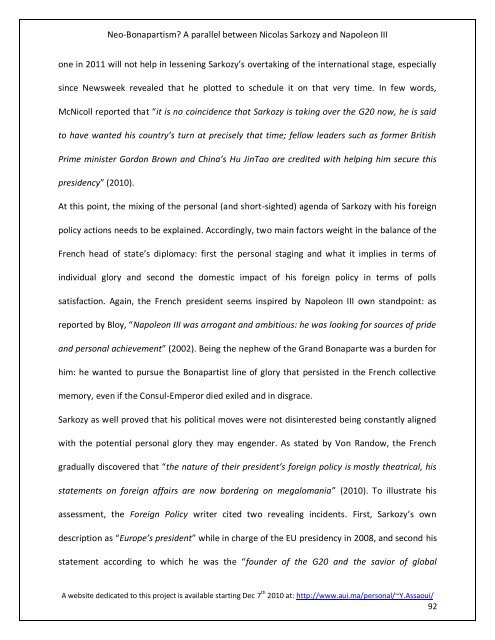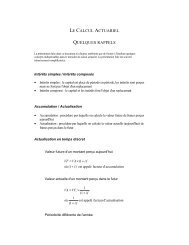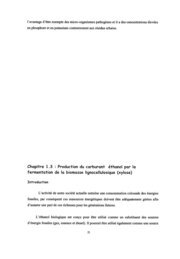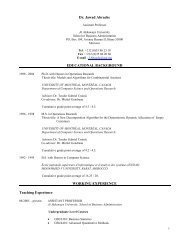Neo-Bonapartism? A parallel between Nicolas Sarkozy and ...
Neo-Bonapartism? A parallel between Nicolas Sarkozy and ...
Neo-Bonapartism? A parallel between Nicolas Sarkozy and ...
Create successful ePaper yourself
Turn your PDF publications into a flip-book with our unique Google optimized e-Paper software.
<strong>Neo</strong>-<strong>Bonapartism</strong>? A <strong>parallel</strong> <strong>between</strong> <strong>Nicolas</strong> <strong>Sarkozy</strong> <strong>and</strong> Napoleon III<br />
one in 2011 will not help in lessening <strong>Sarkozy</strong>’s overtaking of the international stage, especially<br />
since Newsweek revealed that he plotted to schedule it on that very time. In few words,<br />
McNicoll reported that “it is no coincidence that <strong>Sarkozy</strong> is taking over the G20 now, he is said<br />
to have wanted his country’s turn at precisely that time; fellow leaders such as former British<br />
Prime minister Gordon Brown <strong>and</strong> China’s Hu JinTao are credited with helping him secure this<br />
presidency” (2010).<br />
At this point, the mixing of the personal (<strong>and</strong> short-sighted) agenda of <strong>Sarkozy</strong> with his foreign<br />
policy actions needs to be explained. Accordingly, two main factors weight in the balance of the<br />
French head of state’s diplomacy: first the personal staging <strong>and</strong> what it implies in terms of<br />
individual glory <strong>and</strong> second the domestic impact of his foreign policy in terms of polls<br />
satisfaction. Again, the French president seems inspired by Napoleon III own st<strong>and</strong>point: as<br />
reported by Bloy, “Napoleon III was arrogant <strong>and</strong> ambitious: he was looking for sources of pride<br />
<strong>and</strong> personal achievement” (2002). Being the nephew of the Gr<strong>and</strong> Bonaparte was a burden for<br />
him: he wanted to pursue the Bonapartist line of glory that persisted in the French collective<br />
memory, even if the Consul-Emperor died exiled <strong>and</strong> in disgrace.<br />
<strong>Sarkozy</strong> as well proved that his political moves were not disinterested being constantly aligned<br />
with the potential personal glory they may engender. As stated by Von R<strong>and</strong>ow, the French<br />
gradually discovered that “the nature of their president’s foreign policy is mostly theatrical, his<br />
statements on foreign affairs are now bordering on megalomania” (2010). To illustrate his<br />
assessment, the Foreign Policy writer cited two revealing incidents. First, <strong>Sarkozy</strong>’s own<br />
description as “Europe’s president” while in charge of the EU presidency in 2008, <strong>and</strong> second his<br />
statement according to which he was the “founder of the G20 <strong>and</strong> the savior of global<br />
A website dedicated to this project is available starting Dec 7 th 2010 at: http://www.aui.ma/personal/~Y.Assaoui/<br />
92

















